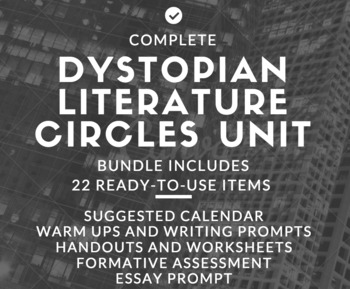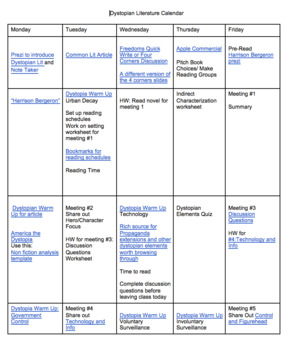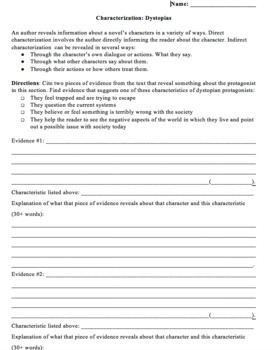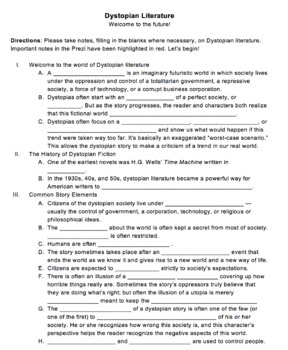Dystopian Literature Circles Complete Unit: Grades 7-10 High School English
- Zip
Description
Turn your reluctant readers into book lovers with page-turning dystopian novels. This ready-to-use dystopian novel unit is adaptable for book groups, independent reading, or whole-class instruction for grades 7-10. As an English teacher, supporting vastly divergent reading levels within the classroom is the ultimate struggle. This novel unit is designed with differentiated reading levels so that your students can love the reading process and master the skills.
Dystopian novels are the perfect opportunity to pair text types and incorporate modern informational texts. Have your students compare their dystopian fictional world to our world today.
Why I love this unit:
-Provide access to differentiated reading materials for varying lexile levels
-Incorporate modern articles for comparison and relevancy
-Varying text types: one full-length novel, a selection of short stories, and current event non-fiction articles
-Identify dystopian and literary elements (dystopian: technology, conformity, figureheads, etc. Literary: theme, character development, setting, etc.)
-ready-to-use writing prompts for meeting days, warm-up prompts, homework assignments, and a final essay prompt
Skills focus:
-learn about and track dystopian elements
-cite evidence and analyze text
-make comparisons to modern current events
-publish an argumentative essay
Over 22 Editable Resources included:
-Suggested Calendar for implementation
-Prezi to introduce Dystopian Lit and Student Note Taker Sheet
-Powerpoint: Understanding Dystopian Elements Apple Commerical and Discussion Questions
-Editable Literature Circle Bookmark with meeting dates and pages for each group
-Freedoms Four Corners Discussion Questions
-Dystopian Warm-Up Writing Prompts
-Suggested novels, short stories, and articles
-Essay Prompt and organizer
-Dystopian Elements Formative Assessment
Seven (7) Homework/Dystopian Elements Worksheets:
-Identifying Theme in Dystopian Literature
-Technology and Information in Dystopian Literature
-Discussion Questions for Book Groups
-Control and Figureheads in Dystopian Literature
-Conformity and Isolation in Dystopian Literature
-Identifying Indirect Characterization in Dystopian Literature
-Making Connections: Our world is More/Less like the world of my Dystopia
Teachers Like you said:
⭐⭐⭐⭐⭐ Michelle M. said, "This resource is wonderful and very thorough in what it provides. I appreciate the close reading options in the unit for the various dystopian texts."
⭐⭐⭐⭐⭐ Jeanne F. said, "Multiple components make Lit Circles easy to set up and to provide focus."
Looking to use just the Dystopian elements worksheets?
Related Products
⭐ Dystopian Elements Worksheets to Supplement Novel Study or Short Stories





